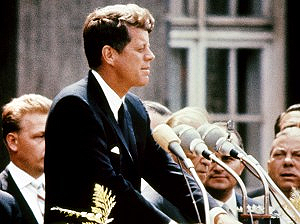
I had intended to pass up the opportunity to join the coteries of commentators analyzing, scrutinizing and memorializing the 50th anniversary Friday, Nov. 22, of the assassination of President John F. Kennedy. But so much of what is being written and broadcast is so contrary to my own memories that I have decided belatedly to join the fray.
The assassination was one of these rare tragedies, like the death of Franklin Roosevelt or the destruction of the World Trade Center, that makes people remember all their lives what they were doing and where they were at that momentous moment—and despite all the objections to current commentary that I express here, make no mistake about it, the assassination was momentous.
The day of the assassination, Nov. 22, 1963, was also a momentous day for me personally. It was my final day of basic training as a draftee in the U.S. Army at Fort Benning, Ky. About midday, I was standing in a long line of graduating recruits turning in the rifles that had been issued to us for training. A guy in front of me had a small transistor radio in his hand, and I heard the news broadcast over it: first that Kennedy had been shot, then a short while later that he was dead.
The combination of emotions at that moment—joy at being done with two months in a physical and emotional torture chamber, shock at the President’s assassination, dread over the coming presidency of Lyndon Johnson—overwhelmed me. The first thing I said to a companion standing in line was, “Oh, no, Johnson as President.”
Much, perhaps most of our retroactive reaction to the Kennedy assassination has been shaped by what came afterwards: the failed presidencies of Johnson, Richard Nixon, Gerald Ford and Jimmy Carter; the 12-year war in Vietnam, the forced resignation of Vice President Spiro Agnew for bribery, and the Watergate scandal that destroyed Nixon.
Until Nov. 22, Kennedy had been a president with declining support and an uncertain future. Elected in 1960 over Nixon by a margin of only one-tenth of one percent, he had frittered away much of even that minimal support with shifting, uncertain policies, failed compromises and bungling foreign adventures that brought the country to the verge of war.
Polls at the time showed Kennedy’s support weak and declining. Opposing the slightly left-of-center Kennedy in the 1964 presidential race was almost certain to be Nelson Rockefeller, a liberal Republican with a strong record as governor of New York.
An occasional speech writer for Rockefeller and a friend of mine, George Guilder, had been working to create a new Washington political magazine. The cover story, of the first issue, which had been printed and was ready to hit the newsstands, was a biting, even vicious assault on Kennedy’s character and policies. The assassin’s bullets killed that magazine as surely as it killed Kennedy.
Kennedy was also trapped in a series of developing and overlapping sandals, the most serious of which was his sexual involvement (it would be a big stretch to call it a love affair) with the wife of a West German military attaché in Washington who the FBI believed was an East German spy. A congressional investigation of this affair was under way. On the day Kennedy was killed, another congressional hearing was actually in progress concerning corruption of Vice President Johnson and his longtime confidante, Bobby Baker.
It is now known that there were other scandals ready to smear Kennedy if he had lived: his dalliance with a Mafia moll, his father’s use of bribery in Chicago, his brother Robert Kennedy’s use of bribery in West Virginia, the involvement of both Kennedy brothers with Marilyn Monroe and her suicide. (Just before dying she had vowed to produce sensational details about a public figure.)
But most of all Kennedy had failed both to manage national security skillfully and to produce a domestic record of achievement.
Thus many who had supported Kennedy were looking for an alternative in 1964, someone at least as liberal as Kennedy (who was not, in 1960s terms, really liberal at all) but more likely to be effective, and that man was probably going to be Rockefeller.
As a college student, I had been excited by Kennedy. When he came to Providence, R.I., I was in a crowd of perhaps 20,000 who attended a campaign speech. He was the first presidential candidate that I had ever seen in person. His youth, his vigor, his attractiveness, his grace, his beautiful rhetoric, his powerful condemnation of the passivity of the Eisenhower administration, his vague promise of change and his ringing declaration that it was time for a new generation to take over were all as appealing to me as to most of those my age. I was only 20, but had I been a year older (the voting age then was still 21), I would have voted for Kennedy.
Three years later, I was suffering the remorse of the jilted lover. Because I had been so enthused about Kennedy’s potential, I was not only discouraged but profoundly depressed by his inability to realize that potential. I, like many others, had given up on the man we had hoped would bring a kind of social revolution to America. That we had placed our bets on an impossible dream was something only the wisdom of the years would make clear.
Now, looking back 50 years later, I realize that Kennedy was a profoundly flawed man, at least as flawed as those who followed him, perhaps even more so. But the country in 1963 was still as young and buoyant and optimistic as Kennedy himself. The tragedies and failures that have marked the intervening 50 years were all in our future.



Responses to “The Kennedy Hype”